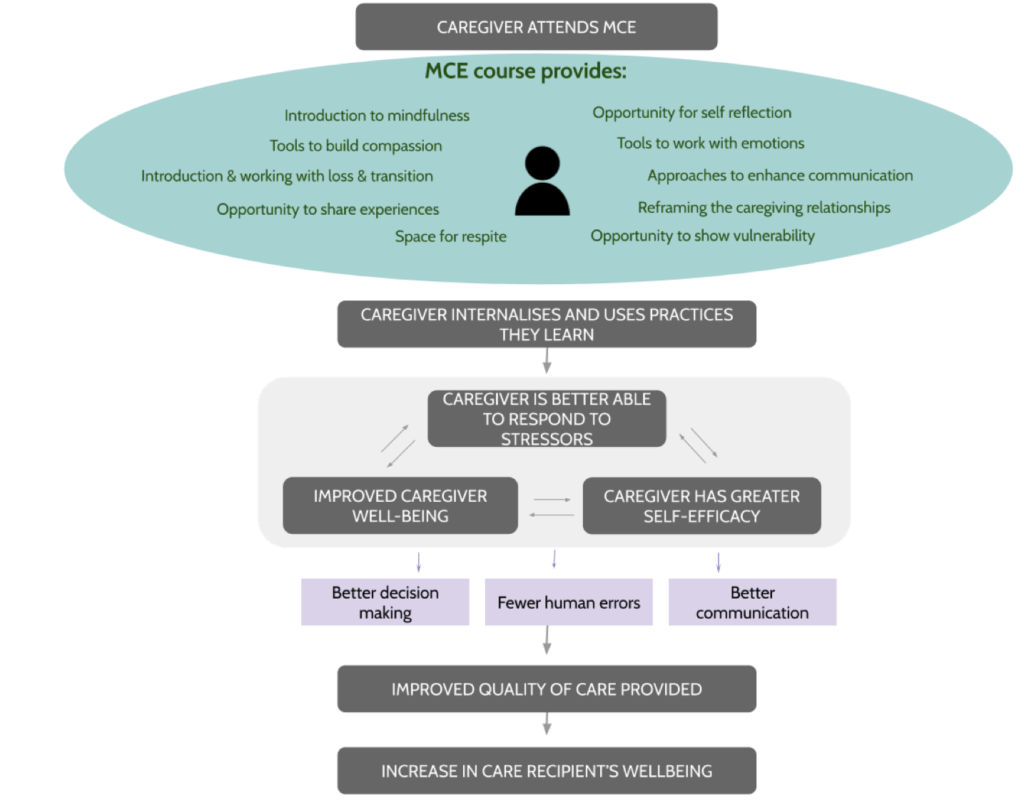Research and Evidence Behind Mindful Caregiving Education
How MCE works
Our Mindful Caregiving Education trains caregivers to use mindfulness-based tools and approaches to help them cope with and skillfully manage stress and challenges that arise. We don’t claim to be able to stop problems showing up, challenges are an inherent part of life, but by using our approaches caregivers can respond to these difficulties in a healthier way, reducing their stress, improving wellbeing and over time building their emotional resilience.
What the research says
Research shows that caregiving can be rewarding and life-enhancing, but that it can also bring significant challenges and emotional strain. When demands of caregiving become more than a caregiver can manage, the caregiver experiences stress which, when it reaches high or chronic levels, has negative impacts on a persons emotional and physical health [1], including increased risk of depression, fatigue [2], and social isolation [3].
Win-win results
A decrease in stress and improved wellbeing for the caregiver also has benefits for the person being cared for, with studies showing that those with higher wellbeing and less fatigue provide a higher quality of care to those they care for [4], [5], [6]. This isn’t surprising, as the saying goes – you can’t pour from an empty cup. If you are exhausted and overwhelmed how can you provide top-quality care to the person you are caring for?
We have illustrated this whole process in a diagram that we call our Theory of Change.

Feedback from our courses
Currently, we have trained over 2,000 people through our courses. Ninety percent of those we surveyed would recommend the course and ninety percent suggest it will positively change the care they provide. Here are a few comments from previous participants:
“This is the most meaningful training I have done to date. I am so grateful for an opportunity to really think about being rather than doing. Thank you!”
“I realize I ALWAYS have a choice and that I am choosing what I do, and how I feel about it. That gives me a sense of freedom instead of entrapment.”
We continue to work on and refine our impact evaluation tools and will share further results at the end of future projects. Watch this space and our blogs for summaries of research findings, our own and other peoples, exploring the benefits of mindful caregiving.
If you’re interested in working with us on this research, please contact us at education@zencaregiving.org.
Research references
[1] Roth, D & Fredman, L & Haley, W. (2015) Informal Caregiving and Its Impact on Health: A Reappraisal From Population-Based Studies. The Gerontologist. 55. 309-319.
[2] The California Task Force on Family Caregiving (2018) Picking Up the Pace of Change in California
[3] Robison et al. (2009) A Broader View of Family Caregiving: Effects of Caregiving and Caregiver Conditions on Depressive Symptoms, Health, Work, and Social Isolation, The Journals of Gerontology: Series B, Volume 64B, Issue 6
[4] Guterman. E, et al. (2019) Association Between Caregiver Depression and Emergency Department Use Among Patients With Dementia. JAMA Neurol.
[5] Ankuda, C et al. (2017) Association Between Spousal Caregiver Well-Being and Care Recipient Healthcare Expenditures. Journal of the American Geriatrics Society, 65(10)
[6] Kumar S. (2016) Burnout and Doctors: Prevalence, Prevention, and Intervention. Healthcare, 2016; 4(3)

